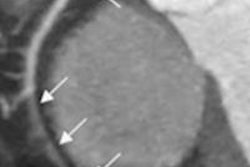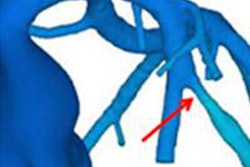Thursday, December 5 | 11:00 a.m.-11:10 a.m. | SSQ14-04 | Room N228
Using a commercially available iterative reconstruction protocol both reduces noise and improves image quality in cranial CT images, according to researchers from University Medical Center Mannheim in Germany."The CT study was done to reduce slice width while keeping radiation dose at the same level, so as to reduce partial-volume effects that can lead to false positives for intracranial bleeding," explained Dr. Holger Haubenreisser in an email to AuntMinnie.com.
The study compared the image quality of thin-slice contrast and noncontrast-enhanced cranial CT using both traditional filtered back projection (FBP) and sinogram-affirmed iterative reconstruction (SAFIRE, Siemens Healthcare) in the raw data space in 29 patients. Noise was measured in three brain regions, while two experienced readers graded subjective image quality.
Subjective image quality of the iterative reconstruction images, particularly among the thinner slice width reconstructions, were consistently higher than those of FBP reconstructions, while image noise was substantially lower, the study team reported.




















